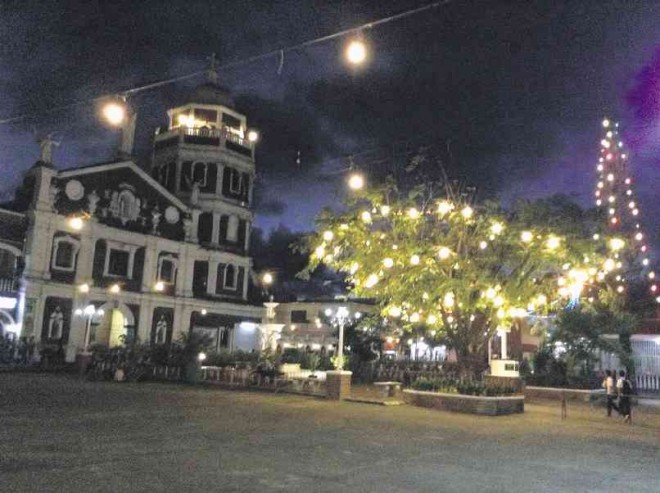
SOLAR energy lights the patio of the Our Lady of Angels Parish Church in Atimonan, Quezon province. CONTRIBUTED PHOTO
LUCENA CITY, Philippines —The patio of the Our Lady of Angels Parish Church in the coastal town of Atimonan in Quezon province is aglow with multicolored Christmas lights powered by solar energy—a dramatic statement to underscore the Church-led campaign against coal-fired power plants.
“Our solar-powered Christmas lights are a manifestation of our continuous opposition against the coal-powered plant to show that there are other alternative sources of clean energy,” Msgr. Emmanuel Villareal, parish priest, said in a phone interview.
Photos of the well-lighted church patio from more than 200, mostly incandescent, bulbs were posted on the community Facebook page, “Atimonan Catholic Church.”
Fund from savings
The sparkling lights, which also lighted three narra trees, are powered by a newly installed off-grid 3.5-kilowatt solar system, which costs around P200,000. “The fund comes from the savings of the church,” Villareal said.
The off-grid solar system requires a battery to store energy collected from the sun for use at night as an alternative source of electricity.
The Catholic Diocese of Lucena and environmentalist groups are spearheading the “No to Coal” campaign against the proposed 1,200-megawatt, coal-fired power plant by Meralco PowerGen in an 80-hectare property in Barangay Villa Ibaba.
The local government has already approved the project in anticipation of more jobs for its constituents aside from a tax windfall expected from plant operations.
Villareal reported that the project had already been issued an environmental compliance certificate (ECC) by the Department of Environment and Natural Resources. “We’re now consulting our lawyers for our next move,” he said.
Start of Advent
The church switched on the solar-powered holiday lights on Nov. 29, the start of Advent, or the preparation on the celebration of Christmas. The patio is lighted from 6 p.m. up to close to midnight.
After the holidays, the solar power will be diverted to other church facilities.
The heritage church was burned down by Dutch invaders in 1640, according to the historical marker installed by the National Historical Commission of the Philippines. The present church and convent at the town center were built between 1687 and 1700, but both were seriously damaged by an earthquake in 1937.
The religious edifice was rebuilt and re-furnished over the years,
Villareal said the church would no longer spend an average of P9,000 for Christmas lights unlike in the past.
The residents are now beginning to fully appreciate the benefits of solar energy, according to Villareal. He recalled one recent incident when the whole town experienced a total power blackout.
“The church premises were the only lighted place in the whole town, thanks to our solar-powered lighting system,” Villareal said.
‘Positive indication’
Villareal said he had been receiving queries on how to install a solar-powered system in homes. “It’s a positive indication that our campaign is gaining ground,” he said.
Atimonan, a first-class municipality (annual income: over P55 million) by the Lamon Bay, is being supplied by a power cooperative with electricity derived from the National Power Corp.
In August, a 5-kW grid-tied solar system was installed on the roof of the antique church, also as part of the campaign against the proposed coal-fired facility. The setup addresses almost half of the daytime electricity needs of the church, or the equivalent of P10,000 to P15,000 in savings from its average monthly bill of P30,000.
The renewable energy project was also the local church’s concrete response to the call of Pope Francis to care for the environment in his recent ecology encyclical, “Laudato Si (Praise Be).”